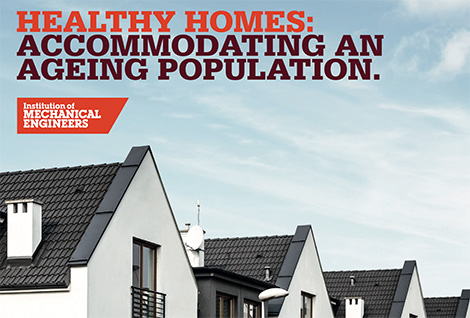
A new report from the Institution of Mechanical Engineers suggests that ‘smart homes’ for older people could save NHS and social care system over £2.5 billion a year – presenting a ‘huge business opportunity’ in the process.
Creating more modified homes, which encourage older people to keep mentally and physically fit for longer, could help save the NHS and social care system billions of pounds each year
“About 7 million UK homes are headed by someone aged over 65 years, who will undoubtedly need some form of assistive technology to help with everyday living, within the coming decade,” said Dr Helen Meese, lead author of the report and Member of the Institution of Mechanical Engineers.
“Homes built with older people in mind, as well as retrofit technology for our existing housing stock, could not only allow people to live in their homes for longer, but also massively reduce costs for the NHS and social care system.
“Furthermore, constructing or adapting homes with older people in mind presents a huge opportunity for construction firms and technology manufacturers. Contrary to popular belief, our growing ageing population is becoming more tech savvy and this will only increase in the decades to come.”
The ‘Grey Pound’ already accounts for over 50 per cent of consumer spending in the UK, which reached £72bn in 2017.
Despite this, demand for smart equipment and devices for older people has so far been slow, as many are poorly designed and aesthetically unappealing.
“Instead of creating products only for older people, manufacturers should focus on creating products that are flexible and span the generations,” offers Meese.
“As a way of encouraging this, manufacturers and construction firms should be required to include older people, such as retired engineers and designers, in product design schemes.”
The report goes on to call for design companies to be required to include a significant proportion of older people in their product design teams – especially in national infrastructure projects.
The UK has a growing number of retired professional engineers and designers, all with significant experience in their professions and a first-hand understanding of their own conditions, which it suggests should be capitalised upon.
Additionally, the Healthy Homes report recommends:
• Government establish financial incentives for construction companies to build ‘smart’ homes. A house that enables people to age well will reduce the cost of residential and hospital care in the long-term, saving taxpayers’ money.
• Government should commit to modernising UK building design and construction regulations, and create a kitemark for cognitive houses which use smart technology to assess and manage an individual’s needs. This will help stimulate industry to grow the market for age-friendly homes.
• Initiating new markets for technology to tackle our existing inadequate housing stock. There is an opportunity for society to drive demand for new markets in retro-fit technology, enabling people to live in their own homes for longer.
• The Department of Health invest in nationwide ‘healthy living for life’ technology programmes through a re-assessment of the ‘personalised health and care 2020’ framework. Collaborating with the Academic Health Science Networks, it should invest in national programmes that focus on technology for prevention of ill health in old age.
Download the full report here and let us know your thoughts in the comments below.






